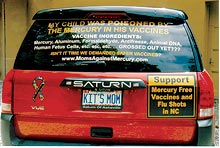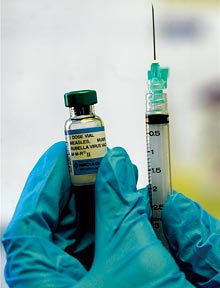In early March, the family of 9-year-old Hannah Poling of Georgia won a settlement from a federal fund that compensates people injured by vaccines. This news thrilled local Moms Against Mercury activists, especially Amy Carson, the group’s president and co-founder.

“It’s going to set a precedent for how the other 7,000 claims in ‘vaccine court’ are settled,” Carson says. “Finally, we have an admission from the government that there might be a problem with our vaccines.”
The U.S. Department of Health and Human Services conceded the Poling case before it could reach court, and the settlement amount has not been announced. The special “vaccine court” overseen by the U.S. Court of Federal Claims rules on requests for payments from the vaccine-injury fund.
The Polings say their daughter, Hannah, went from being a bright, responsive child to exhibiting odd behaviors after a series of vaccination shots (several in one visit, according to her parents). Hannah has been diagnosed with autism. Government officials say the vaccines did not cause Hannah’s disorder, but exacerbated an underlying disorder that led to the autistic symptoms. The government maintains that there is no connection between vaccines and autism.

Like Hannah, Carson’s son’s behavior and development changed significantly after he received a series of vaccinations as a toddler. When 11-year-old Kit was 3, he was diagnosed with toxic mercury levels. According to studies, symptoms of mercury poisoning can mimic the symptoms of autism. Carson believes that a genetic difference accounts for why some children react to the vaccinations while other children suffer no adverse effects.
“There’s a huge population of people who don’t excrete metals well. You see it in Alzheimer’s and heart-disease patients as well. When my son had a hair test, there was no mercury there. But his blood tests showed toxic levels of the metal. So, unlike other kids, he doesn’t excrete mercury through his hair and skin,” she explains.
Carson says the Poling case indicates to her that the government needs to listen to parents and consider testing for people who might have this predisposition.
“Vaccines as a defense from disease aren’t bad in themselves—they just can be made safer. Any parent, if given the choice of safer vaccines, is going to take that option.”
One doctor’s view
Questions and answers with James Whitehouse, M.D.

In the Q&A below, Dr. James Whitehouse, infectious-disease specialist with Asheville Infectious Disease, discusses immunization. Statistics included in his answers are from the Centers for Disease Control and Prevention.
Mountain Xpress: When was the current childhood-vaccine schedule established?
Dr. James Whitehouse: Some childhood vaccines have been used since the 1940s. Over the years researchers have developed vaccines against more diseases. Currently there are 10 routinely used vaccines that protect children against 14 diseases. [The schedule is updated yearly.]
How flexible is the schedule?
The ages at which vaccines are recommended are not arbitrary. Although there are recommended ages for all vaccine doses, the schedule is flexible. If a child doesn’t get a dose of vaccine at the recommended age, the child can catch up later.
How effective are vaccines overall?
When given according to schedule, most childhood vaccinations work between 90 and 100 percent of the time. The last person in the world to get a natural case of smallpox was a 23-year-old cook in Somalia, in 1977. There has not been a case of wild-virus polio in the United States since 1979.
How significantly have vaccines lowered childhood mortality rates?
Prior to vaccination there were 10,000 deaths a year due to diphtheria. Prior to vaccination, each year about 450 people died because of measles, and about 1,000 suffered permanent brain damage or deafness. Today, most doctors will never see a single case of diphtheria or measles, much less have a patient die from them.
How safe are vaccines today?
The United States currently has the safest, most effective vaccine supply in history. However, like any medicine they do sometimes cause reactions. Mostly these are mild, local reactions—soreness or redness where the shot is given—or a low-grade fever.
How often do you see adverse reactions to vaccines?
Serious reactions are extremely rare. These include febrile seizures and, while they might be alarming, children recover from them quickly and they do not cause permanent harm.
Should children get the annual flu vaccine?
The CDC now recommends that all children aged 6 months to 18 receive the annual flu vaccine. Influenza causes more deaths—about 36,000 per year—than any other vaccine-preventable disease. A child less than 2 years of age has an equal chance of serious complications as an adult over 65 years of age.
Thimerosal, which contains mercury, was used as a preservative in childhood vaccines until 2001. It was discontinued because of its possible association with autism-like disorders, although it’s still used in multidose flu vaccines. The Centers for Disease Control and Prevention recently recommended that all children aged 6 months to 18 receive an annual flu vaccine.
Many in the medical community are concerned that the decrease in immunizations will cause a corresponding rise in preventable childhood illnesses. Buncombe County has seen a rise in cases of pertussis (also known as whooping cough, which can be deadly in infants) since the 1980s.
“No vaccine is 100-percent safe,” says Dr. Susan Mims, medical director of Mission Children’s Hospital. “No medicine is 100-percent safe. But you balance that with the tremendous increase in the general health of children since we started immunizations.”
Still, some parents view vaccination as the riskier route.
Christine Conrad and Brent Evans, both nurses at Mission Hospitals, decided not to vaccinate their children, now ages 5 and 8. Conrad says the decision fit with their attachment-style parenting philosophy.
“It was also about personal experience. We know a kid who had profound neurological disabilities resulting from a reaction to a vaccination,” Conrad says.
Their decision was not an issue until the oldest child applied for kindergarten in the Asheville City Schools system. At that time, Conrad wrote a one-sentence statement asking for a religious exemption, although the family does not belong to a religion that forbids immunization.
In some states, parents must present signed documentation from a representative of a church in order to receive an exemption. In North Carolina, parents only need to claim religious beliefs, even if their decision actually is based on personal beliefs.
For more information
Books:
• The Vaccine Book: Making the Right Decision for your Child by Dr. Robert Sears. (This new, popular book, by the son of the famous attachment-parenting expert Dr. Jim Sears, outlines an alternative vaccination schedule for parents who object to the one recommended by the American Academy of Pediatrics.)
• What Your Doctor May Not Tell You About Children’s Vaccinations by Stephanie Cave and Deborah Mitchell
• Vaccines: The Risks, The Benefits, The Choices by Sherri J. Tenpenny
Online resources:
• Moms Against Mercury: www.momsagainstmercury.com
• Buncombe County Health Department childhood immunization schedule: www.buncombecounty.org/Living/Services/Children/immunizations.htm
• Information on religious and medical exemptions for North Carolina: www.immunizenc.com/exemptions.htm
Parents can also claim a medical exemption if a child has a compromised immune system or has had an allergic reaction to vaccination.
According to Asheville City Schools, out of 335 students entering the system in 2007, 27 claimed vaccination exemptions. That’s 12.4 percent of this year’s kindergartners. Buncombe County as a whole has one of the highest vaccination-exemption rates in the state (2.5 percent)—fives times greater than Mecklenburg County, which has almost four times the number of students.
“Given that our rates of immunization are lower than the rest of the state, it’s a concern that we’re at risk for a major outbreak of disease,” says Dr. Mims. “I understand how challenging autism is and how concerned people are about the possible causes. We’re about to dedicate a large number of hospital resources to building an autism program. But I’m also very concerned for the safety of our children.”
— The Associated Press contributed to this story.
[Anne Fitten Glenn is an Asheville-based writer, photographer and mother of two. She writes about parenting and other subjects on her blog and in a weekly column for Xpress called “Edgy Mama.”]



Thank you so much for this thoughtful, balanced view of vaccination. Yours is among the most well-written pieces I’ve ever seen on the subject.
Cornelia Read